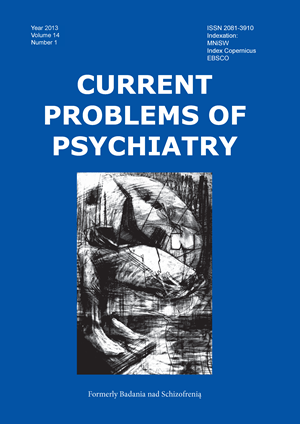Quality of life assessment and coping with stress in patients with shoulder injuries
Keywords:
quality of life, shoulder injuriesAbstract
The objective of the study was to compare the life quality assessment in patients undergoing surgical treatment for shoulder and knee injuries and determining the dependence between the quality of life assessment in patients with shoulder injuries and stress coping strategies.
Examined Group and Methods: The study included 54 patients hospitalised in Arthros Medical Center in Nałęczów, Poland, for shoulder injuries (22 individuals) and 32 people treated for knee injuries. The quality of life in patients was assessed based on the author's own questionnaire, whereas the strategies of coping with stress were measured with the Coping with Stress Questionnaire in the Polish adaptation designed by Januszewska.
Results and Conclusions:
The following conclusions were formulated based on the conducted statistical analyses:
- In the opinion of the patients hospitalised for shoulder injuries their condition significantly impaired their quality of life, gave rise to significant changes in their lives and restricted their capacity to perform work as compared to the patients with knee injuries.
- Significantly stronger and more numerous dependencies were found between a sense of deterioration of the quality of life caused by the medical condition and passive coping strategies in patients with shoulder injuries as compared to the patients with knee injuries.
References
1. Tobiasz-Adamczyk B. Jakość życia w naukach społecznych i medycynie. Szt. Leczenia, 1996; 2: 33-40.
2. Albrecht G.L., Fitzpatrick R. A social perspective on health related quality of life research. W: Albrecht G.L., Fitzpatrick R. ed., Advances in medical sociology, quality of life in health care. Vol. 5. Greenwich CT, London, UK: Jai Press; 1994, s. 1-21.
3. Mc Keena S.P. Measuring quality of life. Eur. Psychiatry, 1997; 12(suppl.3): 267-274.
4. World Health Organization. Report of WHOQOL Focus Group Work. Geneva: World Health Organization; 1993.
5. Saxena S., Orley J. Quality of life assessment. The World Health Organization perspective. Eur. Psychiatry, 1997; 12(suppl. 3): 263-266.
6. Papuć E. Jakość życia - definicje i sposoby jej ujmowania. Curr. Probl. Psychiatry, 2011; 12(2): 141-145.
7. Januszewska E. Kwestionariusz Radzenia sobie ze stresem. Wartość diagnostyczna i wyniki badań młodzieży. W: Oleś P. red., Wybrane zagadnienia z psychologii klinicznej i osobowości. Metody diagnostyczne w badaniach dzieci i młodzieży. Lublin: Towarzystwo Naukowe KUL; 2005, s. 91-124.


